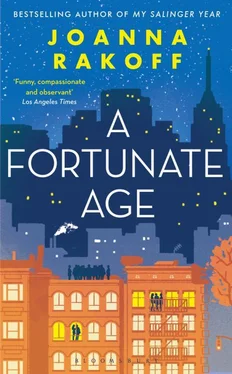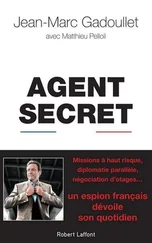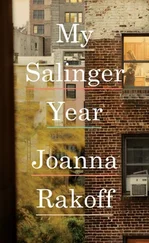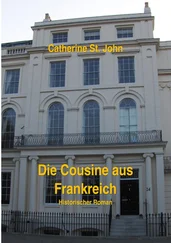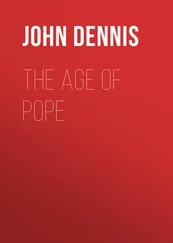Dave and Evelyn’s share of the money was small in comparison to the sums received by their parents, but large by their own meager standards, as both had been impoverished since leaving college. Evelyn, who was always making Dave look bad, had handed the entire sum over to her father to invest. Dave had originally assumed he’d just live off the money, seeing as he was barely employed at the time of his grandmother’s death, having just dropped out of Eastman. But then his father sat him down after dinner one night and suggested that the cash would disappear pretty quickly, much more quickly than Dave could imagine, and Dave should think seriously about making some big, practical sort of purchase, like an apartment. Since moving back to the city from Rochester, Dave had been sharing a place down the block from his parents, on an unsavory stretch of Baltic, across from a loud, crime-riddled school, with an actor named Jake Martin—one of Tal’s less fortunate friends—whom he rarely saw in person but caught glimpses of on Law & Order , on which he’d played an organic fruit vendor, a stabbing victim, and a distraught single dad. Dave didn’t love cohabitation, but buying a place seemed so grown-up. He hadn’t the slightest idea how one might go about completing such a task. He was afraid, however, to display his ignorance in front of his father and mother and Uncle Steve (who was, again, drinking beer at his parents’ kitchen table when this suggestion was made), and so he said, “Yeah, that’s a good idea. I’ll think about it.”
A few weeks later, he paused outside the window of a Court Street Realtor, studying the photographs of available apartments. He recalled the phrase “twenty percent down”—or was it “twenty-five percent down”?—and suddenly realized what this formerly nonsensical term meant: You paid twenty percent of the price of the apartment in cash. Then you took out a mortgage for the rest. Armed with this rudimentary knowledge, he calculated that he could afford to spend about $200,000—that was, presuming he could pay the mortgage and maintenance—and scanned the posted photos for properties within his budget. The next day, he was filling out piles of paperwork—mortgage preapproval and so on—and before he knew it, he’d made a bid on this apartment, the first he saw, with its little garden and strange, dark middle room. It was, the Realtor told him, “priced to sell,” because the owners had already bought a new place, a loft space in a newly renovated building two doors down, and needed the cash.
He’d been back in New York for ten months now, cobbling together his mortgage payments from teaching piano (which he hated), accompanying (which he hated even more), copying scores for composers (which he vacillated between hating and loving), and various sorts of menial labor, like temping or waiting tables (which, strangely, he enjoyed). The trouble was that while he had very strong feelings about what he didn’t want to do, he possessed only an extremely vague idea of what he did want to do. This being that he would like to work on music that people actually listened to, rather than classical music, which, really, no one cared about anymore. Or only the people who played it and wrote it and taught it. Normal people simply weren’t interested. Maybe they listened to the Brandenburg Concertos or “Appalachian Spring” or kept WNYC on as background music or attended a concert once a year so they could feel cultured , but that was it. This was exactly why he’d given up piano. Or this was what he’d told himself when he decided to drop out of Eastman: that he didn’t want to be part of the absurd, archaic institution that classical music had become. He wanted to make real music, music that possessed some sort of relevance to the dominant culture, music that meant something.
But the truth was that over four unhappy years of grad school, he’d come to the sad realization that he was not a genius or a prodigy, as he’d been told throughout his life, and that he would not have a career as a soloist, but would be lucky to get a seat with a second- or third-tier orchestra in a provincial city or a teaching post at a Bible college, also in some unappealing place like Kansas or Missouri, teaching talentless undergrads. Both possibilities fell into the don’t-want-to-do category. In theory, he wanted (he thought) to compose music, to do something really revolutionary, something that would garner the respect of critics and a popular audience, something that would transcend current notions of genre. In practice, however, he was only just now figuring out what such music would be, now that he was in this band, this kind of good band, and there was the remote chance of people playing it. Very remote, though, as the band was really a one-man outfit: the lead singer, Curtis, wrote all the songs and refused to entertain the notion of any other members contributing, though the other guys didn’t seem to care at all. It was just Dave who minded, who would have liked to write his own songs, with a lead piano line, and maybe even sing lead vocals from time to time (he had, he thought, a pleasant tenor).
Lying in his bed, mornings, on Bergen Street—thinking he should really get up and write down the snippet of melody drifting in and out of his brain—he comforted himself with the thought that he was destined for higher sorts of things than pop songs, for this hybrid music he imagined, this relevant classical music. But there wasn’t really any such thing. He would have to invent it. Otherwise, what were his non-pop options? Scoring films ( romantic swell as the spaceship hurtles into the dark heart of the unknown galaxy )? Drafting minimalist pieces that called for the players to bang on sheets of metal or pluck violin strings with their teeth? Or shuffling together neoromantic motifs from the pantheon of canonical symphonies, like all the bright-eyed composers at Oberlin, with their tweed jackets and college scarves? He’d hated them all. What would they do, anyway? Get Ph.D.’s at Berkeley or Stanford. (The money was all out west, for reasons he didn’t understand. It wasn’t like people on the far coast listened to classical music any more than people in New York or Boston.) Live off grants and sad little commissions from Bang on a Can or Kronos? Yes, that’s exactly what they’d do. Then settle into dull teaching gigs and fuck the cute violinists. A life of perpetual irrelevance, like a character in a Philip Roth novel or a Woody Allen movie. Or Herzog, fucking Herzog. No way. No, fucking way.
The irony was, of course, that in college—not to mention in the many years that preceded college—while his friends flailed about, taking classes in performance art or the history of Christian utopian movements, wondering exactly what they wanted to do with their lives, his future had, essentially, been set. Not worrying about career and so on had freed up a lot of his time at Oberlin, allowing him ample hours to fret over other things, like girls or existential matters. During the three years he’d lived with Tal—first in Keep, then in a shabby house off North Professor Street—Tal had patiently listened to Dave ramble on about such things, while they ate cold fried chicken from Convenient Food Mart and sipped cans of Pabst Blue Ribbon.
Now, with the clear vision provided by hindsight, Dave saw that Tal might have found Dave annoying or whiny or, as Sadie would say, “a bit tiresome,” and maybe this was why Dave rarely heard from him anymore. In those days, he’d had a lot more to complain about than did Dave: Tal’s parents were Boston conservatives who scrutinized Tal’s grades each semester and expected him to go to law school, like a good Brookline boy, never mind that Tal had no interest in law (or medicine or business or the other professions deemed acceptable by his dad), had, in fact, never expressed interest in doing anything other than acting, and, more to the point, was not some stupid, deluded sucker, like half—no, more than half—the losers in the theater department (Emily excluded, of course), but seriously, hugely, freakishly talented and in possession of that certain something that makes people, if not stars, then at least compulsively watchable . Everyone thought so, everyone . One of his professors had encouraged him to apply to Yale; another had suggested he leave school and simply find an agent.
Читать дальше
